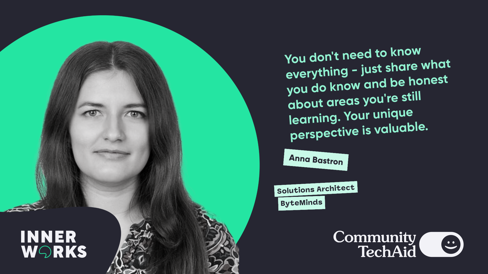Whether you're a seasoned pro or a first-time presenter, this guide will help you go from brainstorming your big idea to delivering a talk that leaves a lasting impression.
Are you speaking (or want to speak) at Codegarden?

AI-generated crowd capturing the energy of Codegarden – created with Adobe.
Where to start when you're planning a Codegarden talk idea?
I usually advise starting to prepare early, while you feel inspired by a recent conference and still have a few months to think about different topics and choose the best one. Though it is never too late to brainstorm ideas, a strict deadline sometimes helps push them over the line.
Think about something you have done or discovered recently that excites you to share with friends or colleagues – this is always a great starting point for an article or presentation. If you are struggling to find the right topic, here are some tips to get you started:
- Reflect on recent projects
What have you worked on recently that made you think, "I wish others knew about this"? It could be a new tool, a method you used, or an approach that solved a particular problem in an innovative way.
- Review challenges and breakthroughs
Think about the hurdles you've overcome in your recent projects. Often, the best talks are born from real-world challenges where the speaker has found creative or effective solutions.
- Ask colleagues for input
Sometimes, it's hard to see your own strengths. Ask your colleagues or friends what they think you're particularly good at or if there was a project you worked on together that had an impact.
- Survey the community
What are people in the industry or community talking about? Attending meetups, reading relevant blogs, and engaging in online discussions can provide ideas for topics that are currently in demand.
- Revisit old work
Sometimes, going back to an older project or revisiting past work can provide new insights. Maybe you've improved your approach, learned better practices, or found something in your past work that's now more relevant.
From my point of view, two things are important when choosing the right topic:
1. You should really be interested in this subject
The key is to pick something you're passionate about because the audience will feel and love your enthusiasm! Talking about something that does not interest you much is also possible, but it takes a lot of skill to make such a presentation engaging.
2. It should be useful for the audience
Are you sharing some tips from your practical experience or a new way of doing something? Either way, think about the takeaways for people who will choose your presentation among other tracks – what is your gift for them?
Once you've chosen your topic, take some time to write the abstract so it's ready when the call for speakers opens.
A quick tip: Avoid relying on AI tools like ChatGPT to write your abstract from scratch, as conference organisers can often spot a generic, AI-generated submission.
Write it in your own voice; it will sound more natural, authentic and appealing.
When waiting is over
The Codegarden organisers have made a decision
Right, you have been waiting for some time, and finally, you've got an email from the organisers.
If you are chosen, that's great! It also means that you have some hard work to do, but I promise it will be rewarding!
If you are not chosen – this is also okay, and it is normal to feel disappointed when your talk is rejected. Remember that the conference committee reviews many great applications and takes multiple factors into account when preparing the entire event agenda. So don't let this temporary feeling ruin your plan! You have an idea and something useful to share, so don't throw it away yet. Instead, try to send your talk to local (and virtual!) meetup organisers, as they are often looking for good speakers and interesting topics. Also, some talks may be better suited for local events and smaller conferences. Another thing you can try is turning your talk into a blog post or a video presentation.
How to use a rejected Codegarden talk to your advantage
Chances are that after presenting your talk at a smaller event or sharing it by other means, you will be able to further refine and improve it:
- You will get feedback and real-life questions from the audience
- You will feel more confident in the material you have got
- It will make it easier to present your talk with every new attempt
- You can share recordings of your previous talks with event organisers next time
I know a fantastic speaker who presented the same talk for 3 years at different meetups and finally made it to Codegarden! After learning his story, I realised how lucky I was to get an opportunity to speak from the very first attempt. Having said that, a month earlier, my talk for another tech conference was rejected, and I initially felt very disappointed. However, when my Codegarden talk was accepted, I was glad that it turned out like this; otherwise, I don't know how I would manage to prepare two completely different talks for April and June, not even to mention the burden of getting visas for two different countries!
Where to get support when you know you're speaking
As you start working on the talk, you may sometimes feel overwhelmed or stuck. It is okay to ask for support when you need it. The Umbraco community is great, and if you would like to hear somebody else's opinion or just get some advice or a little bit of encouragement, try reaching out to:
- Fellow speakers
Seek advice from more experienced professionals, but don't forget that first-time speakers can be a great resource, too 😊 It's also an opportunity to meet and chat with a speaker who may have inspired you at the last Codegarden or an author of your favourite blog or package!
- Event organisers
They are there to support you and make sure everything goes smoothly. They have worked with many other speakers, and they know what to expect.
- Community & audience
The Umbraco community is friendly, which helps a lot when it's your first time speaking. I can tell it from my own experience: quite a few people I met encouraged and supported me before the talk.
- Your friends and colleagues
Use opportunities to practise your talk in front of a trusted audience before presenting to a wider group. I used my company's regular knowledge-sharing meeting as a “dry run” for my Codegarden talk.
It was easier to do for the first time in front of an audience I knew well. My colleagues asked various questions, and I gained much more confidence before presenting it on the Codegarden stage.
Not feeling ready to take the stage?
Many first-time (and even experienced) speakers deal with fear or nervousness when presenting. Feeling anxious is completely normal, and, as one of my speaker friends said, it just means that you care!
It's common to feel like you're not "expert enough" to be speaking on a particular topic. But remember, you don't need to know everything - just share what you do know and be honest about areas you're still learning. Your unique perspective is valuable.
What if you forget something? Everyone makes mistakes, and it's okay! If you forget a point, take a deep breath and move on. Sometimes, pausing for a second can give you the time to recollect your thoughts. You can also prepare notes and have them handy for backup.
If something goes wrong with your slides, demo, or tech, stay calm and improvise. Most audiences understand technical difficulties, and event organisers are there to help resolve any issues.
Public speaking also opens you up to feedback; while most of it will be positive, there may be some constructive criticism. Use it as an opportunity to improve. No presentation is perfect, and feedback will only help you refine your content and delivery for the next time. Prepare responses to questions you think might arise, especially around areas of your topic that might be controversial or misunderstood.
Try confronting these fears head-on so that you can focus on delivering a talk that you are proud of. Even if it's not perfect, remember that the audience is rooting for you and appreciates the courage it takes to get up on stage.
In the end, presenting is about sharing your unique experiences and insights with others, so don't be afraid to try it. It might be challenging at first; it can sometimes feel crazy, but presenting can be a fantastic experience. As my session host Daniela said, it's true: "You will feel great afterwards!"

Innerworks and Cogworks are proud to partner with Community TechAid who aim to enable sustainable access to technology and skills needed to ensure digital inclusion for all. Any support you can give is hugely appreciated.

